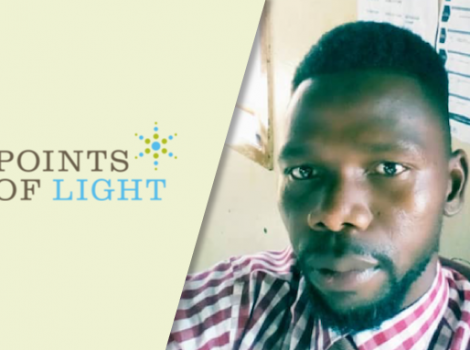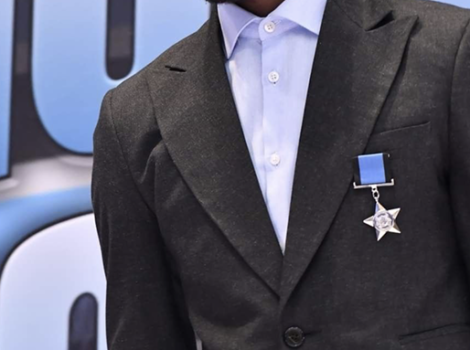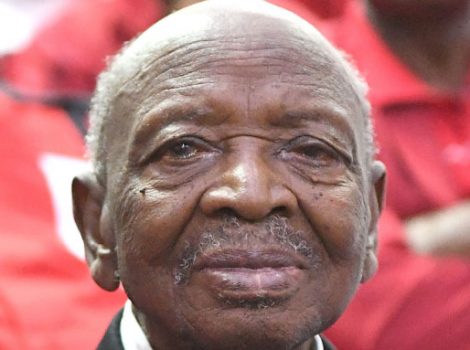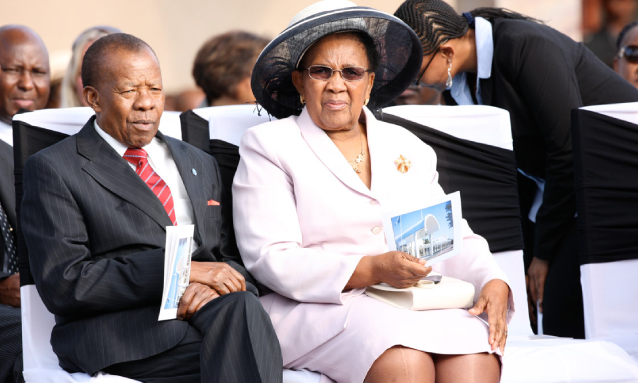
Batswana have laid to rest Botswana’s second President and the very last member of Botswana’s inaugural cabinet, Sir Ketumile Masire. Countless Batswana from across the county, dignitaries representing various countries, family and friends descended upon Sir Ketumile’s village Kanye, to pay their last respects. Even as the funeral was going on, Botswana radio stations and TV stations (ALL two of them J) continued to pay tribute to the great lion, Sir Ketumile. Fittingly, Sir Ketumile was laid to rest alongside Lady Gladys Masire.

The funeral departed from the norm and brought together people who unanimously sought to celebrate more than mourn Sir Ketumile. As laughter rang out and speakers eagerly recounted hilarious tales of their interaction with Sir Masire, each rightly wanted to remember the witty wordsmith, the inclusive leader who upheld democratic ethos to the end and the man widely regarded as the ‘people’s president’. People up and down the country; from comedians to journalists, to farmers, teachers and politicians; all disciplines within which he’s worked, wanted to share with the world how he’d touched and influenced their lives. It is with that same spirit that we share this autobiographical feature piece of Sir Ketumile Masire, as we too bid him farewell.
Until his death on June 22 at the age of 91, Sir Ketumile was the only surviving member of Botswana’s first Cabinet. Additionally, he was also the only surviving member of the founders of the Botswana Democratic Party (BDP). His political life spanned 32 years of active participation. However, it could very well have been longer, if we take into account his years in the Legislative Council.
But his partisan politics lay with the Botswana Democratic Party (BDP), which he co-founded with the likes of first President, Sir Seretse Khama, Moutlakgola Nwako, Goareng Mosinyi, Tsheko Tsheko, Moleleki Tsoebebe and Dabadaba Sedie. Together with Sir Seretse, Sir Ketumile wrote the constitution of the party. Sir Seretse sold the idea of forming the BDP as an alternative party to the Botswana People’s Party to Sir Ketumile and others in November 1961 after a sitting of the Legislative Council in Lobatse. The BPP had indeed taken Botswana by storm with its politics, which roused the emotions of every corner of Botswana they reached.
Sir Ketumile, championed by Sir Seretse
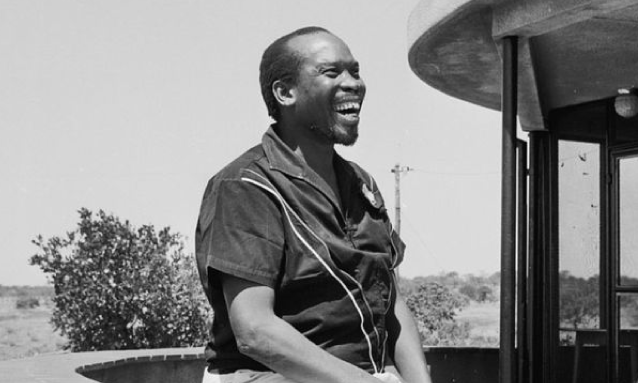
I think it’s safe to say that it was evident that Sir Seretse had immense confidence in Sir Ketumile’s political prowess and might. Some may even say were it not for that very confidence, Sir Ketumile’s road to political success may have proven a lot more tumultuous. In 1969, Sir Masire’s political aspirations suffered a setback when Kgosi Bathoen II resigned from chieftainship and contested the elections that followed against Sir Ketumile and won. That was a deeply sad moment in Sir Ketumile’s political history. However, Sir Seretse felt he could not leave behind his long-term friend with whom he partnered to guide the territory’s future. Thus, he brought him back as a nominated MP.
So impressed was Sir Seretse with Sir Ketumile’s performance that he appointed him Vice President and Minister as well. Subsequently, Masire contested the next elections in the Ngwaketse/Kgalagadi Constituency and won. Towards the 1974 general elections, Sir Seretse paid glorying tribute to Masire for having travelled through the length and breadth of the country “explaining the BDP government programs in the language the people understood.”
Sir Ketumile spent 32 years in active politics, 14 of them as vice president, secretary-general and 18 years as president.
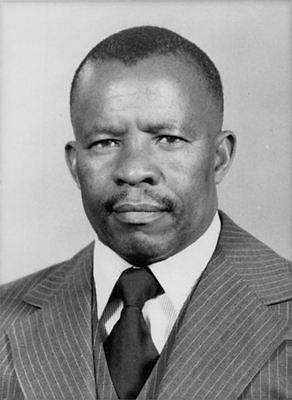 The people’s choice
The people’s choice
Sir Seretse knew and appreciated Sir Masire’s quick sense of humour and ability to talk to people in their ‘language’, traits he took full advantage of even in difficult situations. For instance, in the early seventies, Masire addressed a Kgotla meeting in Mochudi about the benefits of selling cattle to the Botswana Meat Commission (BMC), specifically to tell the locals about the bonus paid by the Meat Commission to the seller.
During question time, a man stood up questioning why the government had kept Bakgatla and other tribes except Bangwato and Bangwaketse in the dark about those benefits for so long. The man went one further, accusing Masire of coming to Mochudi to urge the Bakgatla to sell to the BMC so they could “eat Bangwaketse and Bangwato’s left-overs.”
The man argued his case for a long time, adding that had they been told a long time ago about the existence of the bonus a long time ago they would be rich because the bonus would have supplemented the “agterskot” offered by the BMC. Agterskot is an Afrikaans word for bonus but the man thought the two were two different things.
As Masire sat listening quietly and patiently, the people thought for sure he’d been cornered, that he’d fumble his way through a lame answer in his response to the man. Suffice to say, when he did respond; the people were stunned by his gift of the gab, in what proved to be a first of many, many such interactions, between Masire and the people.
One was heard saying “ehe ba mo romile ba moitse motho wa teng ebile!”
(So they sent him fully knowing his capability!)
Masire told the Kgotla meeting that the people of Serowe spoke of “esele” while those in Molepolole spoke of “tonki” to refer to a donkey and therefore one you wouldn’t say
“I have a tonki but I need to have esele.” Adding, “You in Mochudi, if the BMC is offering you agterskot, then you are receiving a bonus. Bonus and agterskot are one and the same thing.”
That was Sir Ketumile Masire; a man gifted in the techniques of communication. He was known to be talented in the art of negotiation and could switch it up and bring it right back down, depending on his captive audience. He always showed considerable talent for getting what he wanted.
Sir Ketumile-the wordsmith, the diplomat
Sir Ketumile succeeded Sir Seretse who died in 1980. Two years following Sir Seretse’s death, the BDP celebrated 20 years in existence. Sir Ketumile wrote a message, which at the time seemed ahead of its time, almost like a like premonition into the future, a message that touched many BDP members’ hearts.
This is what he had to say:
“We cannot, and must not rest on our laurels and bask in the glory of past performance and achievements of the founding fathers. As we move from the known to the unknown, from the simple to the complex, we need a clear vision and a steady gait, determined in all our endeavours that only the best is good for the BDP and for Botswana.
At this juncture, one cannot help feeling so little done, so much to do. The task ahead is horrendous, a real challenge to be met by our concerted effort.”
Sir Ketumile’s presidency had to contend with the escalating political turmoil in Southern Africa. He was kept so busy that there was a time when he would eat breakfast in Gaborone, lunch in Tanzania and dinner in the air. He would return to Botswana and fly back to either Tanzania or Zambia the following day because there were some new developments that needed a new approach.
One day en route from Addis Ababa, Sir Ketumile had a stopover in Lusaka as his flight needed to refuel. Around ten o’clock in the evening then Zambian President, Kenneth Kaunda arrived at the airport to greet Sir Ketumile. They held an unscheduled meeting, which lasted until the wee hours, just shy of sunrise!
By that time, Mozambique, Angola and Zimbabwe had been liberated. Southern Africa however, still remained a volatile area because events in Namibia and South Africa posed potential threat to freedom in the region. Although the MPLA in Angola was in power, South Africa and the United States destabilised the country by supporting UNITA, while the Soviet Union and Cuba supported the MPLA government. Fidel Castro was more forceful, sending thousands of soldiers to Angola to help the MPLA government to gain the upper hand over South Africa in terms of its military might.
The US came out with what they called “constructive engagement” but it turned out to be “destructive engagement” as the situation in Angola worsened and Botswana bore the brunt of it. The South African President began accusing Botswana of allowing freedom fighters to cross the border to bomb targets inside this country. South Africa cited proximity to the border to point fingers at Botswana and other neighbouring countries whenever it came under fire. If there was an explosion in Zeerust or Rustenburg, it had to have been Botswana, if it happened in the Orange Free State, it was Lesotho and if things started kicking off in Middleburg, it was Swaziland.
Fed up with the whole thing, there came a time when Sir Ketumile felt enough was enough. He decided that it was time president PW Botha had to be told to stop his bullying tactics on Botswana. He used the media to communicate to Botha that Botswana did not have the capacity to police a 1,000+ kilometre-long border with South Africa. He did not stop there. He reminded Botha that a border is a line separating two countries and that being so, South Africa should prevent freedom fighters from entering the country by policing its own side of the border because they had the resources to do so. Masire’s message was received loud and clear. Incensed, Botha responded by bombing Gaborone to punish Sir Ketumile.
Sir Ketumile also didn’t bow down to pressure from South Africa’s attempt to force Botswana into establishing diplomatic relations and converting the labour office in Roodepoort near Johannesburg into a diplomatic mission, saying he did not want to see himself at the “same table with apartheid.”
 In 1980, Sir Ketumile visited the US to sell Botswana to the Americans. After a meeting at the State Department, Secretary of State, James Baker was heard murmuring to a staff member of the State Department that he wished “that Africa could at least have a few leaders who managed the economies of their countries like Masire does.”
In 1980, Sir Ketumile visited the US to sell Botswana to the Americans. After a meeting at the State Department, Secretary of State, James Baker was heard murmuring to a staff member of the State Department that he wished “that Africa could at least have a few leaders who managed the economies of their countries like Masire does.”
Handling BDP party politics
By the early 1990s, Sir Ketumile had been leader of the BDP for 10 years. It proved to be a challenging phase for the BDP. In 1991 he appointed a commission of enquiry chaired by Englishman Kgabo to investigate land issues in Mogoditshane and other peri-urban villages such as Tlokweng and Gabane.
The findings turned out damning evidence that implicated two party elders; Peter Mmusi (BDP’s Chairperson) and Daniel Kwelagobe (BDP’s Secretary General). Based on the findings, the BDP promptly suspended the two party veterans.
The two men resigned their Cabinet positions to clear their names and were subsequently cleared of any wrongdoing through the High Court. Naturally, this led to tensions within the BDP with the Kwelagobe/Mmusi factions each demanding that their men be reinstated.
Masire however, remained steadfast and refused to bow down to pressure, even offering to resign from the presidency rather than to agree to something he considered wrong. Sir Ketumile was by nature a patient person. He never made rash decisions on matters of a delicate nature. While he remained steadfast and resolute in his decisions, he was also very inclusive and listened to other schools of thought, even if he ultimately made his stand. He still listened and considered alternative views.
Masire; the journalist
Himself a former journalist, Sir Ketumile knew how to work with and handle journalists. He started out as a news reporter for a local publication but also worked as editor of the BDP owned newspaper, Therisanyo. He interacted with journalists informally and formally; enjoyed joking around with them as well as engaging them on serious issues. His answers to media questions were mostly brief and to the point.
He was once asked at one of his press conferences why Botswana was spending a lot of money on military hardware. This was during the construction of Thebephatshwa Airbase, which was reportedly creating many a sleepless night for some African countries within the region. Sir Ketumile’s simple answer;
“If you have an army, you must either arm it or disband it; we haven’t decided to disband ours.”
When some Western nations piled pressure on the SADC to grant Zaire (Democratic Republic of Congo) its membership, Sir Ketumile was asked about the status of the country’s application.
He simply replied, “it is being considered.”
Masire often surprised journalists when he attended the Organisation of African Unity (renamed the African Union) summits. Keen to keep expenses to a minimum, he would arrive in Addis Ababa in a 14-seater aircraft while most African leaders arrived aboard Boeing 747s. The ease with which he interacted freely with people came as a huge surprise to many journalists.
They saw him breaking through the human wall created by the Ethiopian soldiers to prevent journalist from crossing the line accompanied only by two bodyguards in amazement. That incident apparently left one Niger journalist wondering as to “what type of President Masire is”. He had never shaken hands with his own president and hoped he could one day visit Botswana to see what made Batswana, including Sir Ketumile, feel free wherever they went. Such was the humility of the legend that was Sir Ketumile Masire. May his soul rest in eternal peace!
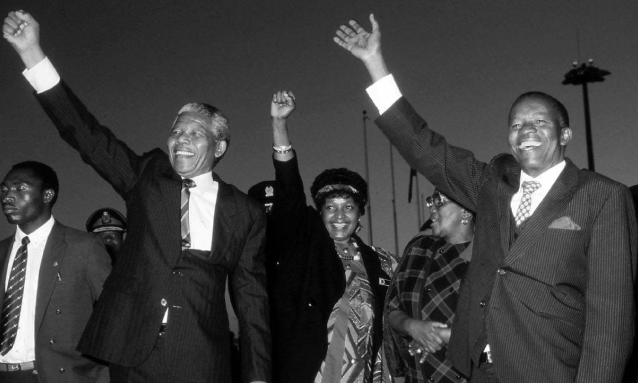
Reference: BOPA

